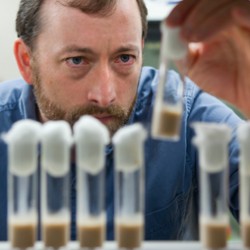New research may solve key problem in physics
Binghamton University physicist Michael Lawler and his colleagues have made a breakthrough that could lead to advances in superconductors. Their findings appear this week in the British journal Nature. Read more
Psychologist takes aim at anxiety disorders
Binghamton's Meredith Coles has mapped out an ambitious plan to diagnose, treat and possibly even eliminate anxiety disorders. Read more
Lab zeroes in on war of the sexes
Biologist Anthony Fiumera’s large-scale experiments with fruit flies may lead to ways of controlling insects that spread disease or harm crops. “The interaction between the tricks males use to manipulate females for the male’s best interests and the techniques the female uses to limit that male’s ability to manipulate her is wonderfully exciting,” he said. Read more
Researcher finds unexpected way to curb teen pregnancy
Nurse Susan Seibold-Simpson has discovered that girls are less likely to be teen moms if their parents get involved in the community. Read more
Probing public policy with a new lens
Pamela Mischen’s research into public policy uses complexity theory to shed light on why programs succeed or fail. Read more
Exploring medical uses of flexible electronics
A federal grant that supports student research on the medical applications of flexible electronics could lead to innovations such as smart bandages and "green" nanotechnology. Read more
Computer scientists empower citizen scientists
Binghamton University computer scientist Kenneth Chiu and his students teamed up with an environmental group to harness the power of data gathered at a New Hampshire lake. The computer scientists and the citizen scientists learned about designing technology for users in the real world. Read more









